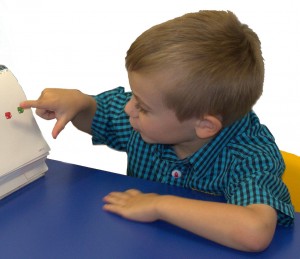
Auditory memory is the ability to hold in your memory, in correct sequence, things you hear, long enough to process the information. Children who have difficulty with auditory memory have difficulty with following instructions, recalling and retaining information, learning new concepts and understanding what is read to them. They often have difficulty developing literacy skills.
If your preschool child has difficulty with auditory memory skills remember:
1. Care for your child’s hearing. Have a hearing test and follow up on any ear infections with your GP.
2. Provide a good listening environment. Turn off of the TV and reduce background noise when you want your child to listen, such as when having a conversation, doing homework or giving instructions. If you have more than one child teach them to wait and take turns when talking rather than talk over each other or interrupt.
3. Model being a good listener. Stop what you are doing, get down on your child’s level and look at your child when they are talking to you.
4. Get your child’s attention and ask them to look at you before you give them instructions or information.
5. Be aware of how many pieces of information your child can remember at one time. Break down longer instructions into short chunks.
6. Provide some visual information to support what you are saying. Use gestures or pointing as you talk. Have pictures or checklists to support instructions that are given many times such as daily routines.
Some activities to help preschool children develop auditory memory include the following:
With all the activities ask your child to look at you and listen carefully. Start simple so your child will be successful then gradually add more things for your child to remember.
1. Play word games such as “I went to the shop and I bought…..” Each player repeats the items from the previous player and adds a new item to the list. You could also try “I went to the zoo, farm, beach…..”. For older children try adding words in alphabetical order, e.g. I went to the shop and I bought an apple, a banana, a cake, a donut….”
2. Give your child messages to pass to others. “Tell your sister to bring me her blue socks”. ”Call Dad and ask him to buy eggs and milk on the way home”. “Ask Grandma would she like to come to dinner on Saturday at 12 o’clock”.
3. Make your own sound shakers by filling small empty plastic juice bottles with things such as rice, pasta and sand to make different sounds when shaken. Take turns to close your eyes and listen when they are shaken and find the right one. Next do two or three sounds in sequence and see if your child can copy your pattern.
4. Make an obstacle course around your house or yard or in the park and give your child instructions to remember and follow. Start with two or three steps and make the instructions gradually longer.
5. Follow instructions using farm animals and blocks. “Make the cow jump over the small fence. Make the dog stand on the blue block”.
6. Use a car mat or draw your own roads with chalk and follow instructions. “Drive the blue car past the tree to the petrol station. Park the red car near the biggest bridge”.
7. Make a collage by cutting out pictures from magazines or junk mail and give your child instructions to follow to paste them and make a picture. “put the cat under the tree”.
8. Use coloured and shaped beads and give your child instructions to follow. “Thread a blue circle, then a red square”. Try stacking blocks or building with lego in the same way.
9. Ask your child to listen to a story. Read two or three sentences at a time then ask your child a who, what or where question about what you have read. ”What was the boy’s name?” ”Where was he going?”
10. Provide lots of listening opportunities such as listening to songs, rhymes, music and stories on tape at bedtime or in the car.
If you are concerned about your child's ability to listen, follow instructions or understand what they hear a speech pathology assessment will help you find out how your child compares to others of the same age and give you strategies to help your child. For more information browse our website.
Have fun developing your child’s memory skills.
Related Blog Posts
If you liked this post you may also like:
Tackling assignments
Why books for christmas
Listen & understand 101
Book Week, All About Stories!



